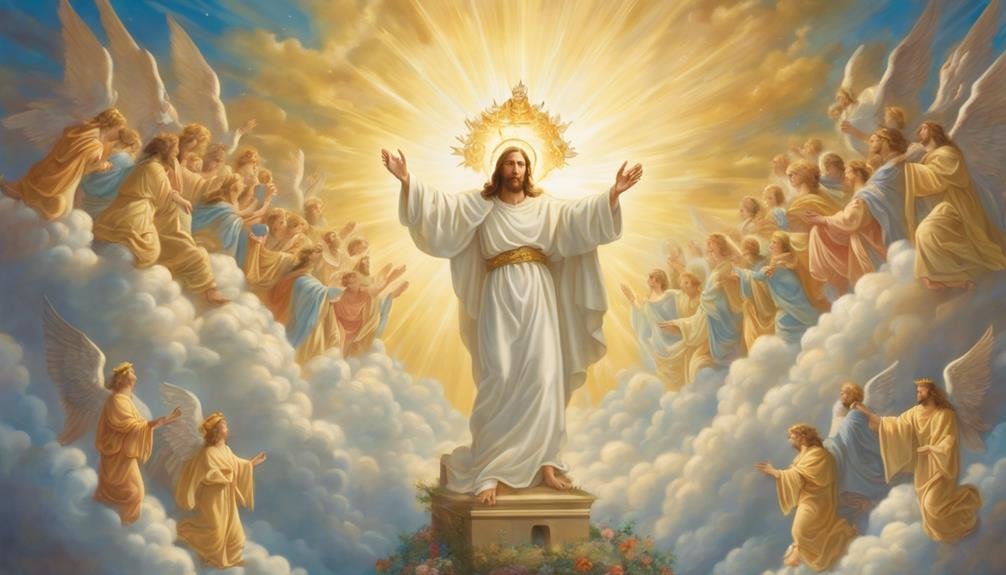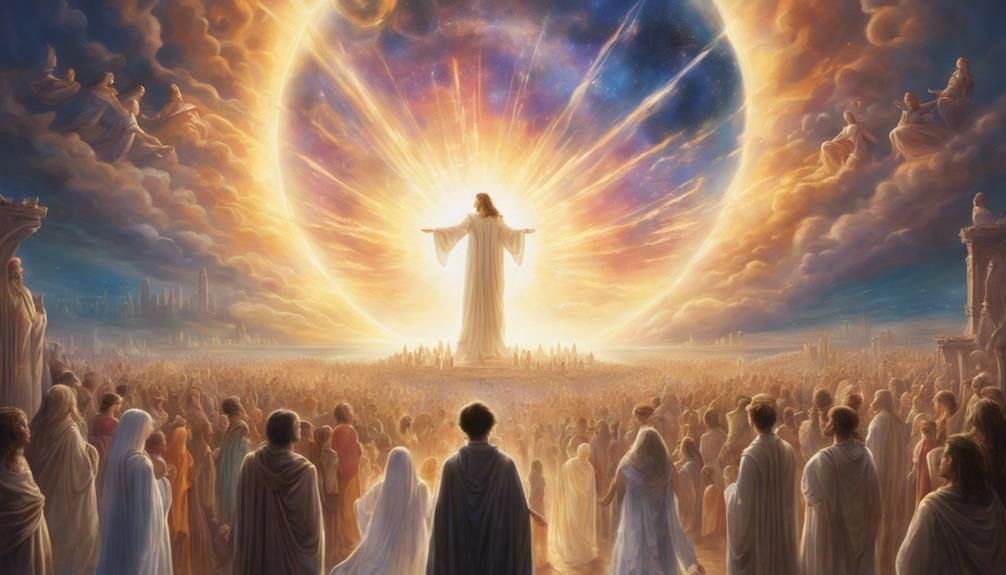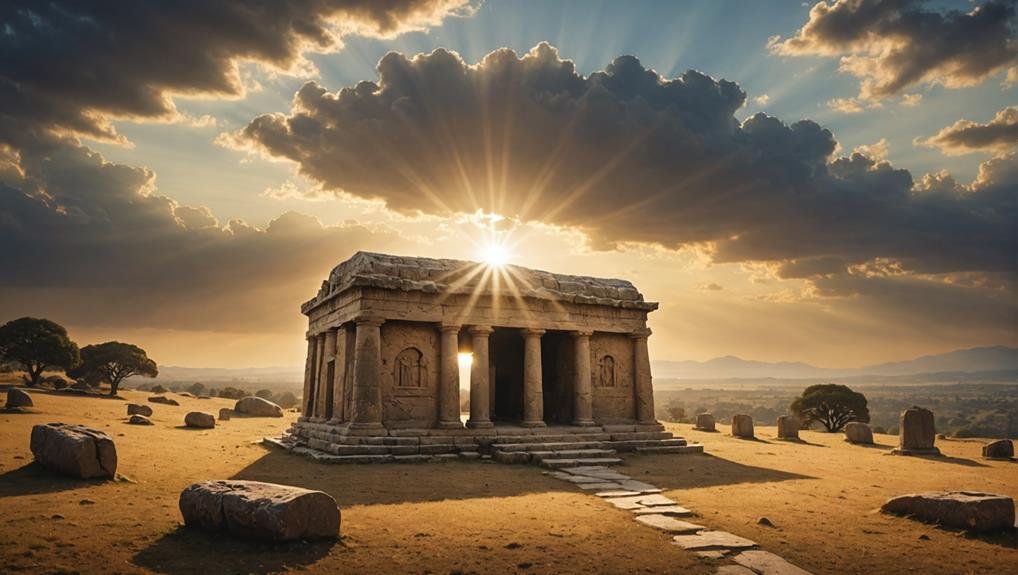You’ve probably wondered about the promise of Jesus’ return and its implications for today. Christians base this belief on various eschatological prophecies, anticipating events like the Rapture and Resurrection, which shape their daily lives and spiritual practices. But what do these terms mean, and how do they influence the hope and actions of believers? The prospect of the Judgment Seat of Christ and the Messianic Kingdom raises many questions about righteousness, rewards, and eternal presence with God. So, what’s the evidence supporting these beliefs, and how should you interpret the signs and prophecies?
Key Takeaways
- The Bible frequently references Jesus’ promised return, notably in Acts 1:10-11 and 2 Peter 3:9.
- Jesus’ return is central to Christian eschatology, anticipated as the Rapture and subsequent Second Coming.
- The return includes a transformative event for deceased believers and living Christians, as described in 1 Thessalonians 4:16-17.
- Following Jesus’ return, a thousand-year Messianic Kingdom will be established, characterized by peace and righteousness.
- Final Judgment and judgment of a new heaven and earth follow Jesus’ return, ensuring eternal peace for the redeemed.
The Rapture and Resurrection

The Rapture and Resurrection are central to the belief that Jesus will come back for His Church before establishing His Kingdom. When you think about the return of Jesus Christ, the concept of the Rapture immediately comes to mind. This event is anticipated with great hope and is a cornerstone of Christian eschatology.
During the Rapture, both the dead in Christ and living Christians will experience extraordinary transformations. Those who’ve died will be raised in a resurrection, united with glorified bodies like Christ’s. This reunion of soul, spirit, and glorified body signifies a complete renewal.
As for living Christians, they won’t be left behind. At the moment of the Rapture, they’ll be caught up to meet Jesus in the air and transformed to be like Christ. This transformation is instantaneous and miraculous, providing an eternal connection with Jesus.
The promise of the Rapture serves not only as a future event to look forward to but also as a powerful motivation for holy living. Knowing you’ll be united with Christ and fellow believers in a glorified state brings comfort. The anticipation of Jesus’ return inspires a life of faith and devotion.
Judgment Seat of Christ
At the Judgment Seat of Christ, you’ll face an evaluation of your works done for Him, not for salvation, but for rewards. Christ will assess your service and faithfulness, motivating living a dedicated life. This moment underscores the significance of your actions and dedication to Him during your earthly journey.
Basis for Rewards
Understanding the basis for rewards at the Judgment Seat of Christ is essential for believers. Following the Rapture and preceding the great tribulation, this event focuses on evaluating how faithful you’ve been in serving Christ. The Judgment Seat of Christ isn’t about determining your salvation—it’s about recognizing your works and faithfulness.
The second coming of Christ will bring unprecedented difficulty, affecting all nations and preparing Israel for their Messiah. During this period, you’ll be evaluated for rewards based on several key aspects:
- Service to others: Did you selflessly serve those around you?
- Faithfulness in trials: How did you handle challenges and tribulations?
- Spreading the Gospel: Were you diligent in sharing the message of Christ?
- Use of talents: Did you utilize your God-given abilities for His glory?
- Stewardship: How well did you manage the resources entrusted to you?
These rewards, given at the Judgment Seat of Christ, will reflect your dedication and faithfulness. Remember, it’s not about earning salvation but recognizing and rewarding faithful believers’ commitment. Expecting Christ’s return should inspire you to serve diligently, knowing that your efforts will be acknowledged in His glorious presence.
Works Evaluated by Christ
Picture yourself standing before Christ at the Judgment Seat, where your life’s work will be evaluated not for salvation but for the rewards you’ve earned through your faithfulness. The Lord Jesus Christ will appraise the works you’ve done in His name, examining your faithfulness and obedience throughout your earthly life.
This moment, known as the Judgment Seat of Christ, isn’t about determining your salvation—that’s already secure through faith in Him—but rather about analyzing the quality and intent of your actions as a Christian.
This Judgment occurred during the Judgment of the Rapture and the establishment of the Messianic Kingdom. It marks the beginning of the great day of His wrath and tribulation, a period that prepares Israel for the coming of their Messiah.
During this time, Christ will reward Christians based on their faithfulness, or they may experience a loss of rewards if their works fall short. It’s a time to reflect on how you’ve lived your life and your choices in service to Him.
Ultimately, the Judgment Seat of Christ encourages Christians to live faithfully and obediently, knowing that each act done for the Lord will be recognized and rewarded.
Motivation for Service
Imagine the profound impact that knowing your actions will be evaluated by Christ can have on your daily life. The Judgment Seat of Christ, which follows the Rapture, is where Christians will be rewarded based on their works done for Him. This isn’t about salvation but about receiving rewards for faithful service. Understanding that you’ll meet the Lord and that your deeds will be scrutinized provides a strong motivation for service.
Your anticipation of Jesus’ return, often called the blessed hope, should inspire you to live a life that reflects His teachings and love. This judgment prejudges IsrJudgmentheir Messiah and occurs during a difficult time affecting all nations.
Visualize how this can influence your actions:
- Every act of kindness: Consider how small gestures can have eternal significance.
- Daily devotions: Spending time in prayer and scripture to grow closer to God.
- Community service: Helping others in your community as an expression of love.
- Evangelism: Sharing the gospel, knowing it has eternal implications.
- Personal integrity: Living honestly and ethically in all aspects of life.
Messianic Kingdom Establishment

The establishment of the Messianic Kingdom will follow the tumultuous Tribulation period, heralded by Jesus’ return alongside heaven’s hosts. Jesus Christ will return to set up His Kingdom, reigning for a thousand years. During this time, the Antichrist will be cast into the Lake of Fire, and Satan will be bound. This period, known as the establishment of the Messianic Kingdom, will be marked by Christ’s firm and equitable rule.
The Messianic Kingdom will bring material and spiritual blessings, lifting the curse on the earth. Nations and their representatives will be judged, and Israel will be permanently restored to her land. This period will be characterized by righteousness and the everlasting presence of God. However, it will eventually close with apostasy and rebellion, leading to the final battle of the ages.
Here’s a quick breakdown:
| Event | Description | Outcome |
|---|---|---|
| Jesus Christ returns | Ends the Tribulation period | Establishment of the Messianic Kingdom |
| Reign duration | Christ will reign for a thousand years | Earth blessed, the curse lifted |
| Judgment | Nations and representatives judged | Righteousness prevails |
| Israel’s restoration | Permanently restored to her land | Everlasting presence of God |
| Final battle of the ages | Apostasy and rebellion lead to the final conflict | Closure of the Messianic Kingdom |
Characteristics of the Kingdom
Under Jesus’ reign, the Messianic Kingdom will be a domain of unparalleled righteousness, equity, and blessings. You’ll witness a world where the curse on the earth is lifted, and both material and spiritual abundance flourish. This Kingdom is characterized by the everlasting presence of God, ensuring a time of peace and righteousness like never before.
Imagine this:
- Rich, fertile lands where crops thrive without fail.
- Peace among all creatures, with predators and prey coexisting peacefully.
- Fairness for all, where equity and justice prevail in every corner of society.
- Unfaltering faithfulness, as God’s everlasting presence, fills every heart with peace.
- Restored Israel, where God’s promises to His chosen people come to fruition.
In this Messianic Kingdom, Jesus’s return means a world transformed. Israel will be permanently restored to her land, fulfilling ancient prophecies and promises.
The righteousness of Jesus’ reign will permeate every aspect of life, bringing an era of unprecedented blessings. While the Kingdom will eventually face challenges, including apostasy and rebellion, its initial phase under Jesus’ leadership will be a testament to divine justice and abundance.
Final Judgment and New Heaven

Ultimately, the Final Judgment will be a pivotal moment where the fate of every soul is determined. Those rejecting the Word of God will face final judgment and judgment in the lake of Judgment, everlasting punishment. This event will result in the separation of the righteous and the wicked, highlighting God’s ultimate justice.
A new heaven and earth will be established, creating a domain where righteousness prevails. This latest creation will be free from pain, suffering, and sin. The New Jerusalem, a magnificent city, will be the eternal dwelling place of the redeemed, characterized by the perpetual presence of God among His people.
| Event | The outcome of the Righteous | The outcome of The Wicked |
|---|---|---|
| Final Judgment | Eternal life with God | Everlasting punishment |
| New Heaven | Dwelling in righteousness | Excluded from the new creation |
| New Earth | Free from pain and suffering | Not applicable |
| New Jerusalem | Eternal presence of God | Not applicable |
The culmination of all things will lead to God’s eternal reign in a new and perfect creation. This awaited transformation is a powerful reminder of the hope and promise that lies ahead for those who follow Christ.
Key Terminology
Understanding important terminology is essential when exploring the return of Jesus Christ, especially the term “parousia.” This Greek word, often emphasized in the New Scripture, signifies Jesus’ presence and arrival. Unlike other Greek terms like “epiphany” (manifestation) and “Eleusis” (coming), “parousia” carries a unique connotation of an awaited presence, particularly highlighting the momentous event of Christ’s return.
The New Scripture frequently uses “parousia” to refer to the return of Jesus Christ, emphasizing its importance in Christian eschatology. When you read passages about the coming of the Lord, recognizing the specific use of “parousia” can deepen your understanding of the text. Scholar Gustav Adolf Deissmann’s work in 1908 brought significant attention to this term, clarifying its distinct meaning and helping scholars and believers grasp its theological weight.
Imagine the anticipation and significance of Jesus’ return through these vivid images:
- A monarch returning to his realm
- A groom arriving for his betrothed
- The daybreak after a prolonged night
- A long-awaited gathering of dear ones
- The apex of a grand voyage
These images, inspired by the Greek word “parousia,” encapsulate the profound meaning behind the return of Jesus as depicted in the New Scripture.
Scriptural References

Building on understanding “parousia” and its significance, let’s explore the scriptural references that prophesy Jesus’ return. The Bible is replete with passages that detail this pivotal event in Christian eschatology. Acts 1:10-11 recounts how Jesus, after his resurrection, ascended to heaven with the promise that He’d return the same way. This aligns with the prophecy in 2 Peter 3:9, emphasizing God’s patience and desire for all to repent before this momentous event.
In the Olivet Discourse, Jesus speaks of the “Son of Man coming in a cloud with power and great glory” (Luke 21:28-33), urging believers to stay vigilant. Romans 13:11-12 also underscores the urgency of living in readiness for His return, describing it as drawing nearer than when we first believed.
The exact timing remains a mystery, as even the angels don’t know the day or hour (Mark 13:32). Matthew 12:36 echoes this uncertainty, stressing the need for constant preparedness. As you live out your faith, grow in grace and knowledge, and share the Gospel, reflecting on these scriptural references can reinforce the hope and anticipation of meeting the Lord in the air.
Historical Interpretations
To grasp the historical interpretations of Jesus’s return, you need to understand the evolution of the term *parousia*.
Gustav Adolf Deissmann’s research highlighted its significance in 1908, showing how its meaning has shifted over time.
Evolution of Parousia Understanding
The concept of “parousia” has undergone significant transformations throughout history, deeply influencing Christian eschatology. Initially, “parousia,” a Greek term meaning “presence” or “arrival,” was used 24 times in the New Covenant, primarily referencing Jesus’ return. Over time, historical interpretations have shaped theological perspectives surrounding this anticipated event.
Understanding the evolution of “parousia” involves exploring various historical settings. Early Christians viewed Jesus’ return as imminent, expecting it within their lifetimes. This urgency shaped their theology and daily practices. As centuries passed, interpretations evolved:
- Early Church: Immediate expectation of Jesus’ return.
- Medieval Period: Focus on the Church’s role and future judgment.
- ReJudgmentn: Renewed emphasis on biblical prophecy and peJudgmentaith.
- Modern Era: Diverse views, including symbolic and literal interpretations.
- Contemporary Theology: Integration of historical-critical methods and global perspectives.
Comparing “epiphaneia” (appearing) and “parousia” highlights distinct nuances in describing Jesus’ return, each term carrying unique implications. Grasping these differences is essential for a comprehensive understanding of Christian eschatology.
Deissmann’s Parousia Insights
In 1908, Gustav Adolf Deissmann‘s groundbreaking work shed light on the deeper significance of the Greek term “parousia” regarding Jesus’ return. Deissmann’s study revealed that “parousia,” traditionally linked with the Second Coming, carried a broader meaning in its historical context. Originally, “parousia” denoted the arrival or presence of a dignitary, unveiling new insights into its New Testament usage.
Deissmann’s insights prompted scholars to reevaluate the term within the historical framework of the early Christian era. By understanding “parousia” in its original setting, you can appreciate how early Christians might have perceived Jesus’ return not simply as a future event but as a present, ongoing reality. This historical background is pivotal for interpreting the theological implications of the term accurately.
Deissmann’s work has profoundly influenced modern theological discussions about Jesus’ return. His findings prompt you to ponder how the early church viewed the presence of Christ in their midst, thereby enhancing your understanding of the “parousia” concept. By integrating historical and theological perspectives, Deissmann’s research continues to shape contemporary interpretations and discussions about the importance of Jesus’ return.
Signs and Prophecies

As believers anticipate Jesus’ return, understanding the signs and prophecies laid out in the Bible becomes vital. Recognizing the signs of Jesus’ return helps you stay vigilant and prepared. The Bible outlines several end-time signs you should be aware of, including natural disasters, wars, lawlessness, and the rise of false prophets. These events serve as indicators that biblical prophecies are unfolding.
Matthew 24 provides a detailed account of what to expect, warning about deception and false predictions in the end times. It’s essential to remain alert and discerning, especially when faced with false prophets who may lead many astray. Prophecies also speak of tribulation, deception, and preaching the gospel to all nations. Understanding these biblical prophecies allows you to navigate these turbulent times with greater clarity and conviction.
Imagine the following scenes as you prepare:
- �️ Natural disasters shaking the earth
- ⚔️ Nations at war, causing widespread chaos
- � Deceptive teachings from false prophets
- � Lawlessness is increasing across societies
- � The gospel is being preached to every corner of the world
Stay informed and prepared as you await Jesus’ return.
Conclusion
As you reflect on the promise of Jesus’ return, let it drive you to live a life of holiness and dedication. The Rapture and Resurrection await, followed by the Judgment Seat of Christ, where your faithfulness will be rewarded. The establishment of the Messianic Kingdom promises righteousness and God’s everlasting presence. Keep your eyes on the signs and prophecies, finding hope and assurance in the ultimate promise of a new heaven and earth. Jesus is indeed coming back.
FAQs
What do Christians believe about the return of Jesus?
Most Christians believe in the Second Coming of Jesus, a future event where Jesus will return to Earth to fulfill the remaining promises of salvation. This belief is rooted in various passages in the New Testament, including the Gospels and the Book of Revelation, where Jesus promises to return and bring final judgment, esJudgmentpejudgmente God’sKingdomm.
Key Beliefs:
- Second Coming: JesusJudgmentturn to Earth in the future.
- Final Judgment: He will judge the living and the dead.
- Restoration: Establishment of God’sKingdomm on Earth.
What does the Bible say about Jesus’ return?
The New Testament contains several references to the return of Jesus, often referred to as the Second Coming or Parousia:
- Matthew 24:30: Jesus speaks of His return, saying, “They will see the Son of Man coming on the clouds of heaven with power and great glory.”
- Acts 1:11: After Jesus’ ascension, angels tell the disciples, “This same Jesus, who has been taken from you into heaven, will come back in the same way you have seen him go.”
- Revelation 22:12: Jesus says, “Behold, I am coming soon, bringing my recompense with me, to repay everyone for what he has done.”
These verses emphasize the belief in Jesus’ return as a visible and glorious event, though the exact time is unknown.
When will Jesus come back?
According to Christian doctrine, the exact time of Jesus’ return is unknown and is not meant to be predicted by human understanding. Jesus Himself states in Matthew 24:36, “But about that day or hour no one knows, not even the angels in heaven, nor the Son, but only the Father.”
While many Christians look forward to this event, most believe it is important to remain spiritually prepared, as the Second Coming could happen at any moment.
Key Points:
- Time Unknown: The exact date of Jesus’ return is not known.
- Spiritual Preparedness: Believers are encouraged to live in readiness.
What is the significance of Jesus’ Second Coming?
The Second Coming is significant in Christian theology because it represents the fulfillment of God’s promises for redemption, judgment, anJuandandtimatultimatel. Key elements include:
- Final Judgment: Jesus will judge the living judgment dead, separating the righteous from the unrighteous.
- Restoration of Creation: God’s Kingdomm will be fully established on Earth, bringing eternal peace and righteousness.
- Resurrection of the Dead: Believers expect the dead to be raised and granted eternal life with God.
Significance:
- Judgment: Jesus will bring final judgment on Judgment.
- Restoration: God’s Kingdomm will be established in full.
- Resurrection: The dead will judgment to Judgmentlife.
How should Christians prepare for Jesus’ return?
Christians are encouraged to live in a way that reflects readiness for the return of Jesus. Preparation involves:
- Spiritual Growth: Living a life of faith, love, and service to others.
- Repentance: Turning away from sin and seeking forgiveness from God.
- Faithfulness: Remaining steadfast in belief and following Jesus’ teachings.
Preparation Tips:
- Spiritual Readiness: Grow in faith and live a life reflecting Jesus’ teachings.
- Repentance: Continuously seek forgiveness and avoid sin.
- Faithfulness: Stay committed to Christian principles.
Let me know if you need more details or adjustments!

